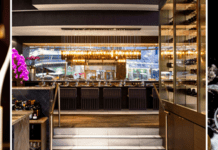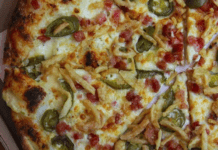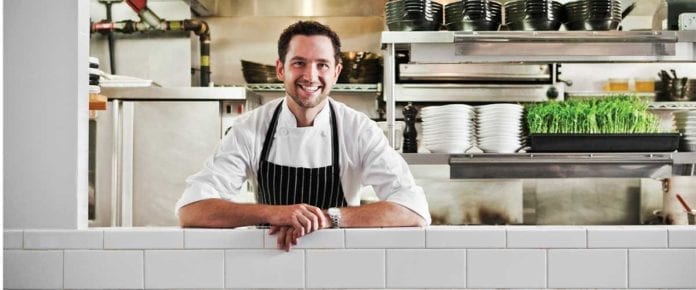After winning Top Chef Canada in 2012, Carl Heinrich’s life changed dramatically. First off, the $100,000 prize he won as part of the competition allowed him to open Richmond Station in Toronto’s downtown core with his friend and business partner Ryan Donovan.
“Winning [Top Chef Canada] catapulted me into a new stratosphere,” says Heinrich. “What I have today I owe to Top Chef. Not only does the show continue to put butts in the seats at my restaurant, which is really important for any restaurant, but it also gave me the capital to invest.” Secondly, he learned a lot of good lessons along the way. “I knew I was a good cook and that I had a bright future but [the win] proved I could compete with the best and that was a good confidence booster.”
After graduating from Stratford Chefs School in 2005, where he first met Donovan, Heinrich moved to New York to work for acclaimed French chef Daniel Boulud at DB Bistro Moderne. “[Boulud] is one of the best French chefs alive today and it was a great experience for me. New York is a dog-eat-dog world — it’s a great environment for a young chef.”
After four years with Boulud, Heinrich moved back home to Vancouver. “I was 23 years old and the executive sous chef of a $9-million restaurant. I had 40 people working under me and I wasn’t learning as much as I wanted to on a daily basis. Where I was in that restaurant was capped and I didn’t have the opportunity to move to another restaurant because of the visa issue,” Heinrich says of his decision to leave New York.
As fate would have it, Heinrich was offered a management position at Boulud’s new Vancouver restaurant. “In that summer I went to Europe and spent six weeks working in kitchens in Monaco and France. I came back to Canada completely broke and really excited to make the new restaurant the best we could.”
But after about a year, the wanderlust hit Heinrich again. “I felt the need to move on. I needed to learn something else; I needed to work under a chef that could teach me or I needed to run my own kitchen somewhere.”
There were no opportunities like that in Vancouver at the time so in 2009, Heinrich packed up his life again and moved to Toronto. With no job and no money, Heinrich reached out to his old friend Ryan Donovan, who was working at Cowbell Restaurant. “Carl has always been the best chef I know,” says Donovan. “Even when I [first] met him at 17 years old, he was incredibly accomplished and gifted. Truth is, he’s taught me most of what I know.”
Heinrich became the sous chef at Cowbell, where Donovan introduced him to whole animal cooking. “For me it was exactly what I wanted, it was what was missing in my life — the opportunity to create food that was unique, a style that was unique and a formula for cooking that was new for me. I had been cooking the same food for five years; it was great food — some of the best French food in the world — but the opportunity to buy whole animals and cook food that way was the best thing that had happened to me.”
The pair bought whole steers, elk, rabbits, chickens, ducks and fish — as well as fresh local produce — from farmers they visited on a weekly basis. “I was putting food on the plate that was so delicious, so earnest and so true to what I believed in; it was really exciting.”
Heinrich and Donovan left Cowbell within a year for Marben Restaurant on King St. “That’s when things really took off for the both of us. We brought our style of cooking and buying food to Marben and it became a defining factor in how people saw me as a chef. I do things a little bit differently.”
With food that is inventive, unique and daring, Heinrich is one of the most exciting chefs in the city. “People wanted to come and work for us. We became known as the farm-to-table guys.”
In the summer of 2012, Heinrich was able to parlay his growing reputation into his own restaurant. Armed with a $100,000 cash prize and a $30,000 kitchen from his Top Chef Canada win, Heinrich and Donovan opened the 80-seat Richmond Station at the corner of Yonge and Richmond Streets and began serving the type of seasonal, local, farm-to-table fare they’d become known for at Marben.
“We’re at the point where we have a successful business, cash flow is good and we can have some fun. We can attract good cooks, buy good food and play around a bit,” he says.
Being part of the community is integral to Heinrich and his team and with a slew of charitable events taking place every year in Toronto, there are many from which to choose. Heinrich and his team attend approximately 50 to 60 off-site events every year, many of which are charity-related. “Richmond Station is busy,” says Heinrich. “It makes money and I believe we have a responsibility to give back [to the community].”
There are many ways to give back, says Heinrich, whether it’s purely by mentorship and showing up at charity events or making monetary donations to local organizations. “We’ve put a lot of effort into our relationship with Community Food Centres Canada — a lot of chefs in this city have. It’s a great organization and we’re really proud to be a part of it. We’re young and we have energy and it’s a pleasure to be able to do it. Everybody has that responsibility but not everyone has the opportunity — we do.”
“For me the focus has always been on our staff and making them the best they can be,” says Heinrich, noting Richmond Station boasts some of the most talented staff in the city. “I’m 30 years old and for the first time, I’m the oldest cook in the kitchen. I’m the leader now and that’s a really exciting phase in my life and in my career.”
Heinrich believes Richmond Station’s reputation for being innovative draws talent to his kitchen. “We’re cooking food that no one else is cooking; we’re doing things nobody else is doing; we’re buying food the way nobody else is,” says Heinrich of his technique-driven, ingredient-inspired style that features entire animals and sides of beef, which are chopped up on-site. “It’s a really attractive place to be for any cook — but especially for a young, excited cook just out of school. These kids are coming in and they’re green and they’re excited as hell. I see myself in them and I’m so full of life for the opportunity to teach them.”
The menu features items such as lamb neck croquettes with heirloom tomatoes, tzatziki, fried chickpeas, red onion and dill ($13); rabbit two ways with smoked bacon, sweet corn, red pepper pakora, oyster mushrooms and white wine gravy ($25); and duck confit lettuce wraps served in iceberg with kimchi, toasted peanuts and General Tao sauce ($10).
“Carl has always been more mature, thoughtful and skilled than peers 10 years his senior,” says Donovan. “He’s a compassionate and dedicated leader and young cooks aspire to have the same qualities. When a young cook asks for his mentorship, he takes the relationship seriously and nurtures it. The young cooks around him learn how to be great cooks, for sure, but they also learn how to be great teacher and mentors, too.”
As for offering advice to wannabe chefs, Heinrich admits it’s all about individual preferences. “It’s about what each person needs to get them to stick around. Maybe they’re here just for the money, maybe for the experience — not everyone needs the same bit of advice so learning how to manage everyone uniquely is a really fun challenge and it’s the best part of my job.”
Asked what he’d tell culinary graduates, “I’d say ‘just go for it!’ There are so many of you and the opportunities are so few at the top. You have to work harder and you have to be better — look at everyone around you right now because you have to be better than all of them. And you have to want to be better than all of them; if you don’t, they will. This is not a very fun industry for people who don’t want to jump in with both feet.”
With about 60 staff at Richmond Station, Heinrich finds himself with many mentoring opportunities and if he sees someone in his kitchen he thinks has potential, his best advice for them is to leave.
“Go! Work for the best chef you can find and when you’ve learned all you can, leave there, too, and find another great chef,” says Heinrich, who has moved across continents seven times in pursuit of his culinary dreams. “When you can’t learn anymore, figure out what your style of food is and stick to it because you aren’t going to be a well-regarded chef unless you have a unique style. You can’t develop that unless you build a really solid foundation of technique, of taste and of ideas — a lot of it is creativity but that means nothing unless you have the technique to back it up.”

















